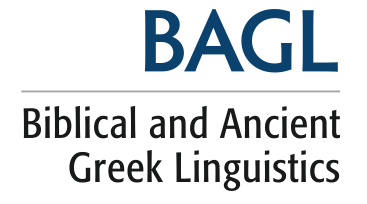Biblical and Ancient Greek Linguistics (BAGL)

Biblical and Ancient Greek Linguistics (BAGL), in conjunction with the Centre for Biblical Linguistics, Translation, and Exegesis at McMaster Divinity College and the OpenText.org project (www.opentext.org) is a fully refereed on-line and print journal specializing in widely disseminating the latest advances in linguistic study of ancient and biblical Greek. Under the senior editorship of Professor Dr. Stanley E. Porter and Dr. Matthew Brook O'Donnell, along with its assistant editors and editorial board, BAGL looks to publish significant work that advances knowledge of ancient Greek through the utilization of modern linguistic methods. Accepted pieces are in the first instance posted on-line in page-consistent pdf format, and then (except for reviews) are published in print form each volume year. This format ensures timely posting of the most recent work in Greek linguistics with consistently referencable articles then available in permanent print form.
Patrick Henry College, Purcellville, VA, USAI examine the grammar of Matt 1:25 and argue there is an obligatory scalar inference meaning ‘after but not before.’ I conclude the grammar of Matt 1:25 contradicts the view that Mary remained a virgin after the birth of her son.Keywords: Matt 1:25, perpetual virginity, ἕως, postclassical Greek, pragmatics
See AWOL's full List of Open Access Journals in Ancient Studies
No comments:
Post a Comment